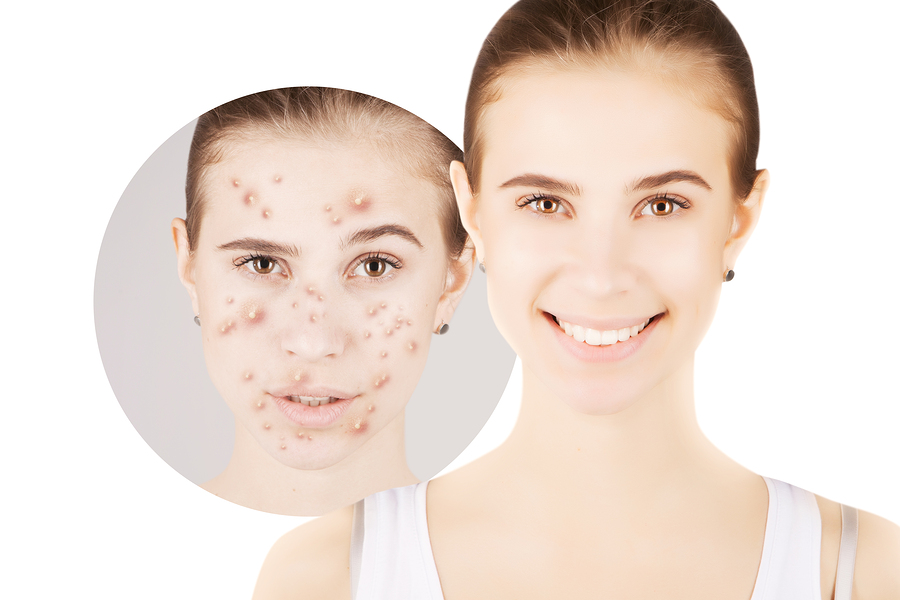- Make It Yourself Lavender Heart-Shaped Bath Bombs!
- 20 Things You Never Knew About “Down There”
- 12 Best Foods For Those Suffering From Arthritis Pain
- 12 Personal Hygiene Mistakes Almost Everyone Makes (Mom Never Told You About #4!)
- 15 Medicinal Plants And Herbs From The Cherokee People
- 12 Mind-Blowing Benefits Of Drinking Coconut Water During Pregnancy
- 12 Outstanding Winter Foods That Won’t Fatten You Up Like A Christmas Turkey
Bad Skin Need Not Be (And Isn’t!) A Life Sentence
Beautiful skin starts from within
The skin is the largest organ of the body, and potentially gives you the most trouble. The nature and the seriousness of skin problems may differ, and some folk will be worse off than others.
Bad skin is not only a physical problem, but because the face is the first part of you that anyone sees, it can have a negative effect on your emotions such as self-esteem, or self-confidence. It makes no difference whether you are male or female, young or old, somewhere along the days of your life – you will be afflicted, to a greater or lesser degree, by bad skin problems.
Fortunately there are steps you can take to help clear up your skin and restore its natural beauty.
What causes bad skin?
Acne is the most common cause of bad skin, and it can affect the face, back, neck, and arms. Acne, as well as less serious breakouts, may be as a result of hormonal changes, issues of low immunity, and very often poor dietary habits.
Careless hygiene when it comes to regularly cleaning your face and body, over exposure to the sun, and smoking, also play a role in bad skin and premature aging.
Topical creams and lotions do help, but research has shown that the best way to keep your skin healthy and delay the aging process, it to provide nourishment from within.
When you eat the right foods, you will feed your skin with the important nutrients it needs to stay supple, soft, and free of breakouts.
Continue to Page 2
Which are the best foods to eat for healthy skin?
Most fruits and vegetables contain powerful antioxidants which help to combat free radicals which damage skin at a cellular level, often causing premature wrinkling and age spots. In addition to antioxidants, fruit and veggies are also high in important vitamins and minerals.
Here is a list of the most important items to include in your diet for healthy skin.
- Vitamin C is important to fight free radicals and strengthen the tiny blood vessels in the skin. Foods include broccoli, blueberries, citrus fruits, strawberries and sweet potatoes.
- Vitamin E containing foods like almonds, avocados, nuts, and sunflower seeds, support healthy skin growth, and are also high in antioxidants.
- Garlic is rich in polyphenols which are micro-nutrients which nourish the skin.
- Beetroot has several nutrients necessary for healthy skin including vitamin A, vitamin E, and trace minerals potassium, sodium, calcium, and magnesium.
- Red grapes have potent natural chemicals and antioxidants. Studies have shown that the chemicals in red grapes successfully treats inflammatory skin conditions such as eczema and psoriasis. Red grapes are also known to help counter the effects of allergic reactions on the skin.
- The humble guava is making a name for itself as an additive to cosmetics in the manufacturing of creams and make-up products. The guava, which is a true tropical fruit, has enormously high contents of folic acid, potassium, copper, and manganese which all help to regenerate skin cells. Research has also shown that guavas are rich in vitamin K, which is known to improve treatment of blemishes, dark circles under the eyes, as well as ease acne redness and irritation.
- Dark chocolate is high in antioxidants, and the presence of cocoa keeps the skin hydrated, firm, and supple.
- Eat tomatoes every day. The chemical known as lycopene which is found abundantly in tomatoes, is a powerful antioxidant which keeps your skin healthy and glowing. Studies have also shown that lycopene can help to heal acne scarring.
- Use olive oil for cooking. The oleic acid content in olive oil helps to keep skin cells hydrated, supple and firm. Oleic acid is classified as an unsaturated fatty acid omega 9, and is excellent for health in general.
- Omega 3 is another essential fatty acid essential for skin health, with the focus on inflammatory conditions like eczema and psoriasis. Omega 3 is not made naturally in the body, so has to be obtained from the diet. here are some of the best sources of omega 3:
- Nuts such as walnuts and pecans.
- Fatty fish like salmon, sardines and tuna. Fresh cooked, canned or smoked will all be fine.
- Spinach, broccoli, Brussel’s sprouts, and cauliflower, are all vegetables which have a high content of omega 3.
- Eggs also contain a mega content of omega 3.
- The oil-producing sebaceous glands in the skin which keep the skin moisturized, and help to repair skin damage need a godly amount of zinc to operate effectively. Zinc is obtained from fish, lean red meat, poultry, wholegrains, nuts and seeds.
There may be times when you are not able to get all the nutrients you need from your food. Natural supplements containing C and B vitamins, is a fantastic way to fill the gap when some nutrients are lacking from your food.
Continue to Page 3
Eat to beat most common skin problems
There is a definite relationship between healthy eating and beautiful, healthy skin. Following a healthy diet leads to a healthy digestive system, which leads to a healthy colon free of the build-up of toxic waste, which often results in skin inflammation and breakouts.
Acne and pimple breakouts are among the most common skin hassles which are caused by a bad diet full of junk food and sugary items. Cutting out the unhealthy refined flour and sugar items will be a good way to start a new way of eating.
When you make changes to your eating habits, be patient – it could take a little time before you see some improvement. There is no magic involved, you will not see anything overnight.
It may take a few weeks for your new skin to push through and be visible, but by persevering with simple lifestyle changes you can achieve the success you dream of.
If you have a persistent skin condition which is causing you concern, it is a good idea to visit a doctor or a dermatologist for a professional diagnosis.
READ ALSO: The Most Effective Acne-Fighting Herbs For Perfectly Clear Skin Infographic
Something to take away
For that vibrant, younger-looking, glowing skin, making the effort to adopt some positive lifestyle changes, like ensuring that only the right foods are added to your plate, may be the best way to make certain you have healthy skin to last you a lifetime.
References:




































